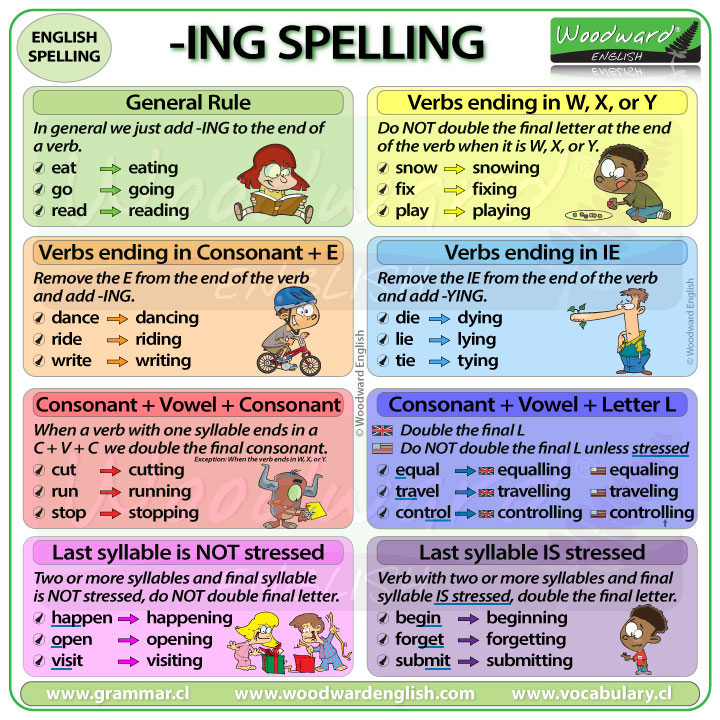The following is a guide to the correct spelling of –ing forms of verbs and gerunds.
The general rule when changing a verb into its -ING form is just to add -ING to the end of the verb.
| Infinitive | ING form |
|---|---|
| to feel | feeling |
| to go | going |
| to work | working |
| to sleep | sleeping |
- She wasn't feeling very well.
- He is working on a new project.
- The children are sleeping so be quiet.
Spelling exceptions
The following exceptions exist when spelling words ending in ING:
1). If the verb ends in an E we remove the E and add ING.
| Infinitive | ING form |
|---|---|
| to live | living |
| to have | having |
| to make | making |
| to take | taking |
- People are living longer now than they were 100 years ago.
- We are making a chocolate cake.
- He was taking his time to get ready.
2). If the verb ends in a consonant + vowel + consonant, we double the final consonant and add ING.
| Infinitive | ING form |
|---|---|
| to stop | stopping |
| to sit | sitting |
| to plan | planning |
| to get | getting |
| to swim | swimming |
- The policeman is stopping the traffic.
- We are planning a surprise party for our teacher.
- I think I am getting a cold.
3). If a two-syllable verb ends in a consonant + vowel + consonant, we do not double the final consonant when the stress is on the first syllable.
| Infinitive | ING form |
|---|---|
| to happen | happening |
| to enter | entering |
| to offer | offering |
| to suffer | suffering |
- What is happening?
- They are offering a discount.
- Many people are suffering from a lack of food and water.
4). But, we do not double the final consonant when the verb ends in W, X or Y or when the final syllable is not emphasized.
| Infinitive | ING form |
|---|---|
| to fix | fixing |
| to enjoy | enjoying |
| to snow | snowing |
- He is fixing his bike.
- We are enjoying this great weather.
- It's snowing outside.
5). If the verb ends in IE we change it to YING.
| Infinitive | ING form |
|---|---|
| to lie | lying |
| to die | dying |
| to tie | tying |
- I know you are lying to me!
- You should water your plant more because I think it is dying.
- The little boy is tying his shoelaces.
6). If the verb ends in consonant + vowel + L, we normally double the final L and add ING.
Note: In the United States (US) they do not double the L when the accent is on the first syllable.
| Infinitive | ING form (UK) | ING form (US) |
|---|---|---|
| to travel | travelling | traveling |
| to marvel | marvelling | marveling |
- I have been travelling around South America for 6 months.
- He was marvelling at her beauty.
7). If the verb ends in a stressed vowel + R, we double the final R and add ING.
| Infinitive | ING form |
|---|---|
| refer | referring |
| defer | deferring |
- Are you referring to this one or that one?
- They are thinking of deferring payment of their mortgage.
8). If the verb ends in an unstressed vowel + R, we do not double the final R and add ING.
| Infinitive | ING form |
|---|---|
| to offer | offering |
| to suffer | suffering |
| to whisper | whispering |
- I am offering you a special deal.
- He is now suffering the consequences of his actions.
- I wonder what he is whispering in her ear.









0 Comments